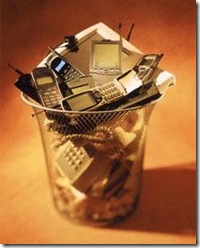One of the great things about tech is there's always something new coming out; and Moore's Law tells us that the power of computers doubles every 18 months-- tech is ever evolving and advancing.
What is not so great about that is our gear becomes obsolete, and winds up gathering dust on a closet shelf or taking up room in our garage. What did you do with that huge CRT monitor when you got the nifty flat-panel LCD?
Our old tech equipment contains many materials and chemicals that are quite poisonous -- lead, mercury, cadmium, and arsenic, to name a few (aka "e-waste") -- and they must be properly disposed of so they won't cause an environmental disaster and poisoned water supplies, like it's currently doing to China, India, and Pakistan.
So, how do you get rid of that old stuff the right way?
Essentially, there's two good ways to dispose of your old tech gear-- recycling, and donation.
Recycling: We know that we can't just toss our old stuff in the trash, so what do we do with it?
1) You may not know this, but when you purchased your item, you may have also paid a "disposal fee" as part of the purchase price, and the manufacturer will take the old item off your hands (this is standard practice these days). Contact the device manufacturer and ask how to recycle their item.
Dell, for example, will take any Dell product in for recycling at no charge.
2) Your town may accept e-waste for a fee (this covers the cost of properly separating out the toxins), and a Internet search (or the Yellow Pages) will point you to the nearest drop-off point. Also, where I live, there are special "amnesty days" once a year, and toxins can be turned in at no cost.
3) Another form of recycling is donation, where your old tech can be put back to beneficial use.
Donation: I am a big fan of donating tech and getting more life out of it. Two factors must be considered when thinking about donation: the age of the device, and whether it's in working order. If the device is of a fairly recent vintage, it probably can be put to use whether it's currently working or not-- but no matter how well it's working, nobody's going to want Pentium II computers, 10 Mbps co-axial networking gear, and daisy-wheel printers (okay.. maybe somebody would.. but good luck finding them!)
1) Your old tech may actually be worth a few dollars. Repair tech's like me sometimes acquire old equipment for replacement parts. If you've an inclination, you may want to list your old gear in the classifieds, and/or on sites like eBay and Craig's List. It won't make you rich, but you might be surprised at the interest you get.
2) Donating non-working gear can actually assist job training, and so just because it's not working doesn't mean you can't donate it. You may want to check with schools near you and see if they will accept your stuff (I'm thinking High Schools and Adult Schools, but..?) Also, you may want to consider contacting the Free Geek community.
Recycles.org is a Website that specializes in helping you locate a place willing to accept your gear.
3) Get a receipt. Your donations may (probably) qualify for tax credits.
* A word of caution: When getting rid of any device that has storage memory-- such as a computer's hard-drive, or cellphone's Flash-- you must take special precaution and thoroughly eradicate the 1's and 0's: simple deleting is NOT ENOUGH. Your data can be retrieved. Please read Delete does NOT erase your data*– preventing recovery and follow the advice there before allowing the device to leave your control.
Copyright 2007-8 © Tech Paul. All rights reserved.![]() post to jaanix
post to jaanix


No comments:
Post a Comment